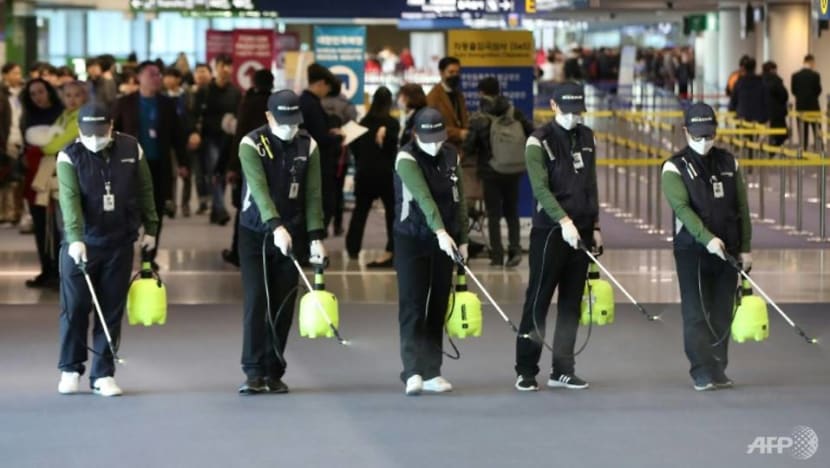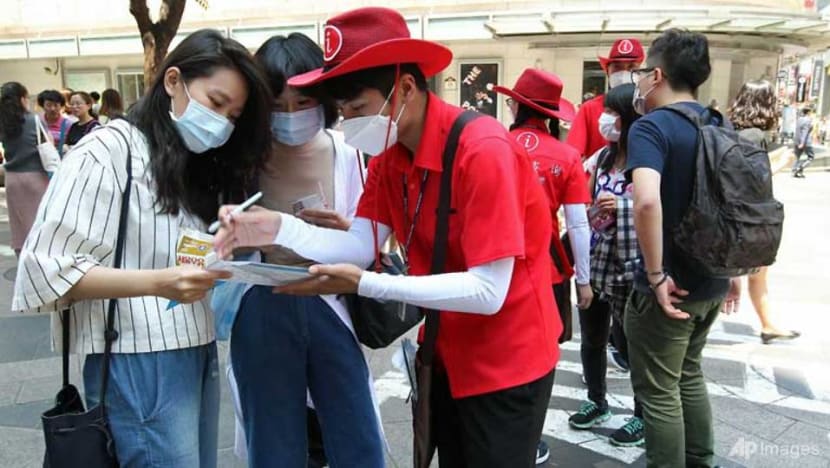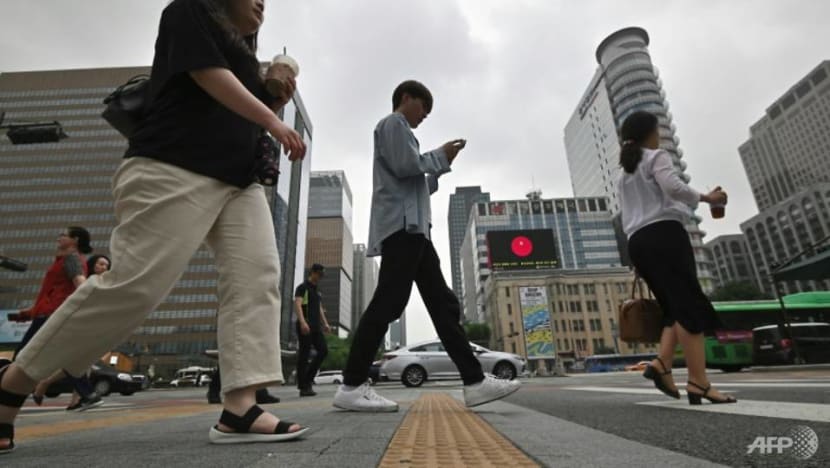commentary Commentary
Commentary: Allowing employees to work from home can help South Korea manage the Wuhan virus
In a risk-averse culture, government and businesses may have difficulty acting quickly to ensure business continuity while protecting the workforce, says Steven Borowiec.

Cleaners spray disinfectant at Seoul's Incheon international airport earlier this week after South Korea confirmed its first case of the SARS-like virus AFP/STR
SEOUL: The website of South Korea’s public health authority currently features an image of a smartly dressed woman and man wearing masks while posing in front of a mishmash of signboards written in Chinese characters.
In depicting two people who are remaining calm while exercising caution as a new coronavirus afflicts the country and businesses and families brace for disruption, the government appears to be telling its people: Do not panic but do wear a mask.
Next to the photo is a message imploring all South Koreans to take part in efforts to prevent the spread of coronavirus, a mysterious new illness in the country.
READ: Wuhan virus: Number of cases in China tops 800, death toll hits 26
While the government is calling on the country as a whole to work to keep South Korea safe, this latest health scare underscores the reality that in this country, it is still the government that is responsible for management during challenging times.
BAD TIMING
South Korea this week reported two cases of the new coronavirus that appears to have originated in the Chinese city of Wuhan and has also been reported in Singapore, Thailand, Taiwan and Japan.
The number of cases in China grew to more than 800 this week, raising fears of a global pandemic, with even the US reporting a case.
In an unfortunate bit of timing, while South Koreans are fretting over the disease this week, the country announced its weakest economic growth since the global financial crisis of a decade ago.
Of late, South Korea’s export-dependent economy has dealt with tremors from the trade conflict between the United States and China, as well as the country’s own spat with Japan.
READ: South Korea confirms second case of Wuhan virus
In announcing the weak growth figures, a central bank official highlighted how the new coronavirus could pose a risk to consumption as happened in 2015 when there was an outbreak of the Middle Eastern Respiratory Syndrome (MERS) in the country.
BUSINESS AS USUAL
South Korea’s economy ought to be less vulnerable than ever to a public health crisis, as there are now ways for businesses to maintain operations with workers not being in the same physical space.
This is a country with some of the most widely available Wi-Fi connection anywhere in the world, meaning that it wouldn’t be difficult for workers to be just as productive from home.

But despite having the technological infrastructure, South Korea has generally been slow to adapt to workplace evolutions like remote working.
The country’s traditions of collectivism still posit that all members of a team should, whenever possible, be together in the office for the whole day. Someone who suggests that they would prefer to spend the day at home by themselves than in the office with the team might be seen as selfish or anti-social.
READ: Commentary: Snakes possible source of Wuhan virus but more research needed
Beyond trust or perception issues, there is a deeper problem of a risk-averse culture in South Korea that deters employers from taking such bold moves.
A RISK-AVERSE CULTURE
If South Korea seems risk averse, part of this may be explained by the country’s national psyche.
Having fought a destructive civil war in the early 1950s, many Koreans were left feeling that the country got a late start and had to work harder than others to develop.
Having built a successful economy, Korean policymakers sometimes fear potential blowback from risky moves.
That thinking is also extended to organisational cultures, where newer additions such as flexible work arrangements and remote working are deemed contrarian to and may dilute the ethos of a strong work ethic built into the national psyche.
I remember years ago one successful Korean businessman telling me over dinner, “You in the West had a head start on us. We lost our country once. We cannot lose it again.”
A DEEPER PROBLEM
That risk averse mind-set also extends to the government, which has been facing criticism for stifling innovation.
READ: Commentary: Wuhan virus compounds challenges facing China
A telling example is the case of Tada, a ride-sharing service. The country’s large and vocal taxi lobby successfully pushed the government to enact legislation that would ban Tada from operating, arguing that the company could push traditional taxis out of business.
To many, the case of Tada sent the message that the Korean government is more interested in protecting vested interests than in promoting innovation.

This week, in a case local media dubbed “revenge of the nerds,” a group of tech entrepreneurs launched a political movement with the hope of pushing through regulatory reform that would create conditions for innovation.
The founders describe being frustrated at the government who promise to ease red tape, then fail to follow through.
According to one founder, South Korea has missed out on chances in cloud, big data, drones, autonomous driving, blockchain and sharing-economy technology because of the regulations.
GOVERNMENT SIGNAL IS KEY
That perception of an indecisive government was also reienforced during the last epidemic outbreak in South Korea – MERS in 2015. Many here are making comparisons with that episode to question if things will be managed better this time around.
The South Korean public was critical of the government in 2015 for bungling its response to the outbreak by failing to properly implement quarantine measures and not sharing information transparently with the public.
READ: Commentary: Wuhan virus sparks questions over local Chinese officials' disclosure of information
Still, even though 36 people died out of 186 reported cases, MERS never snowballed into the full-blown pandemic many feared, but the uncertainty surrounding the ailment took a toll on South Korea’s economy, leading to steep drops in travel and many forms of consumer spending.
This time around, the country’s public health authorities appear to be more decisive in taking steps to manage the risk of contagion. Airports and seaports have announced stepped-up screening measures, with separate procedures for flights from Wuhan.
But that boldness and decisiveness from the government must extend wider.
BOLDNESS NEEDED
In times of crisis in South Korea, it is the government that is expected to lead. South Koreans look to official institutions for guidelines, and if things don’t go well, it’s the government that gets the blame.
Similarly, businesses and organisations will also be looking to signals from the government in implementing working arrangements to contain the risks to the workforce and the economy.

Ironically, the outbreak of this virus may provide the government with an opportunity to ease flexible working arrangements into the workplace culture in South Korea. That may not be a bad thing in taking a step towards a more innovative and risk-taking culture overall.
More pressingly, if the South Korean government is serious about not letting the Wuhan virus take a significant hit on its economy, then implementing business continuity processes is a crucial step that has to come sooner rather than later.
During MERS in 2015, the slow response and lack of transparency by the government saw measures to contain the virus such as school closures and making public the list of hospitals affected with cases carried out almost a month after the first case in May.
Even then, without any clear signal from the government and lax isolation or quarantine measures, few companies implemented business continuity processes to isolate their staff from the risks.
In the coming days, we will find out how much the South Korean government has learned from the experience with MERS.
Yesterday, my phone buzzed with an urgent message from the government, the kind of text they send out when monsoon rains create risk of flood, or when air pollution rises to dangerous levels, imploring everyone to wash their hands, cover their mouths when coughing, and yes, wear a mask.
I hope to receive another such government alert soon that advises employers to take the necessary steps to protect their business processes, including allowing their staff to work from home.
Steven Borowiec is the politics editor of Korea Expose.














